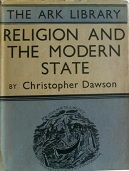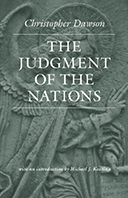Published in 1936, this was Dawson’s first book on the modern political situation, which he felt impelled to write in the light of the threatening scenario developing in Europe at the time. He wrote the book with some reluctance and was apprehensive about how it would be received on account of its unconventional approach. In the event, it proved a great success, although he refused to have a second edition published due to the misunderstanding of his views.
Central Themes
Controversially, Dawson viewed Capitalism, Communism and Fascism as three forms of the same thing – a materialistic tendency towards the mechanization of human life and the complete subordination of the individual to the State and to the economic process.
His first object of criticism is Marxist Socialism, on account of its uncompromising denial of any spiritual consciousness or transcendental reality and its desire to erradicate religion. He then proceeds to attack Capitalism for its “philosophy of separation and irresponsibility which breaks up the moral organism of society into a chaos of competitive individualism”. As for Fascism, he condemns its appeal to violence and its deification of the State, which is seen as an absolute end in itself.
In response to these threats, Dawson did not propose a theocracy, although he could see the value of such systems in the past. Rather, he advocated a strengthening of the role of religion in society, not as a controlling element but for its positive effects on the human mind – “by altering the focus of human thought and opening the closed house of secular culture to the free light and air of a larger and more real world”.
Evaluation of the Work
Some critics of the work have objected that Dawson’s condemnation of Fascism is not sufficiently strong, in view of the undeniable evils it committed. However, in a letter to one of his critics, Prof. Bruno Schlesinger – who later became a close friend and associate – Dawson shows that he is and has always been essentially anti-totalitarian and that the purpose of this work was not to weigh up the relative merits of Communism and Fascism but to highlight “the choice between the mechanised order of the absolute state… and a return to a spiritual order based on a reassertion of the Christian elements in Western culture.”
Dawson’s penetrating analysis of the different political forms of recent times and their antecedents in the history of thought remain both historically interesting and of continuing relevance today. In view of the fact that the problems he so clearly outlines have still not been resolved, his book can encourage readers to look at the crisis of our own age with new eyes.
PRAISE FOR THE ORIGINAL EDITION:
“Dawson has written a masterly study of the various forms of social idealism which force themselves upon our attention today. Christians will find his book of absorbing interest; a great body of others of widely divergent points of views will find here a clearer picture of Catholic views and much criticism of their own beliefs that will be hard to answer; both, perhaps, will gain a better understanding of the nature of our difficulties because of this lucid, fair, and convincing analysis of the modern crisis.” – Mason Wade, The American Review, 1936



